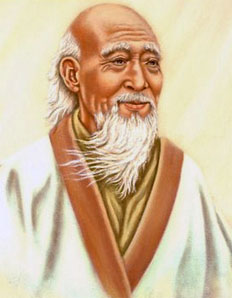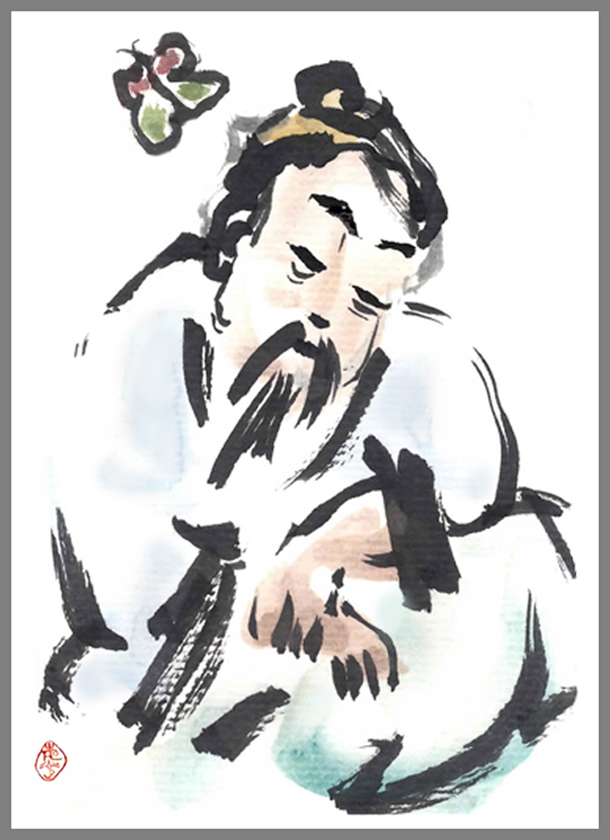“The nourishment we are tracking is not a supplement; rather, it consists in ridding ourselves of all ‘supplements’ which only lead us ‘to force life’. ‘To feed our life celestially is to free life from everything that weighs us down – be it knowledge acquired, agreements made, virtues adopted, or successes won – and to restore it to its sole injunction – immanence” (François Jullien – Vital Nourishment Departing from Happiness, Chapter 3).
Whereas the West had focused on the acquisition of knowledge, Jullien writes, the East has focused on “feeding one’s life,” which, Jullien defines as “purifying one’s life, adding that it “is not progress toward something; it is renewal.” In Chapter 3 of Vital Nourishment – Departing from Emptiness, Jullien explains how “attachment to life turns against life,” a paradox also familiar to Buddhist practitioners. But, while Buddhists unpack it in psychological terms, Chinese wisdom, though not denying the part played by desires, explain it in terms of a cosmic dynamism that drives change: one must align one’s life with the intimations of the Dao, and allow life to take its course spontaneously (zhiran).
“Regardless of whether the desired result is longevity, glory, or success, it must come about on its own”

Jullien writes that “the Laozi sets this forth as a principle: ‘The reason why Heaven and Earth are able to endure is that they do no live for themselves. This is how they become capable of longevity. ‘To live by oneself’ or ‘for oneself’ is the Laozi’s way of saying that one is preoccupied with one’s own life and thinks only of it. Heaven and earth, which give generously of themselves to feed others, do not seek longevity for themselves and that is why they ‘endure’.” Living is not an aim in the sense that I want to live, to ‘live to live’,’ evermore, at any price; it is rather, a result, just as elsewhere in the Laozi we learn that it is not ‘by showing off’ that we ‘gain renown’ or ‘by imposing ourselves’ that we ‘become illustrious’.” Regardless of whether the desired result is longevity, glory, or success, it must come about on its own. It must follow from the initial conditions, including both the process upon which we embark and the resources we invest, rather than be sought after as such. Any effort we make to bring about the result is wasteful and stands in the way of the advent sponte sua of the desired outcome. He who seeks to force the result expends his potential.”
An absolute principle of existence that is disturbingly similar to a well-known passage of the Gospel
But Jullien immediately remarks: “What we have here, then, is a maxim stated as an absolute principle of existence that is disturbingly similar to a well-known passage of the Gospel. It is so similar that one wonders if some anthropological truth is being expressed, a truth couched, in the one case, in terms of the vital, and, in the other, in terms of a division of the world into two realms: the here below which intersects with longevity, and the hereafter which corresponds to life everlasting. In any event, the antithetical power is the same, as is the way the attachment to life turns against life. ‘The man who loves his life will lose it, while the man who hates his life in this world will keep it for eternal life’, says the Gospel. Here, ‘life’, which translates the Greek psuche, or ‘soul’, but corresponds to the Hebrew nefesh, refers in the Greek of the Septuagint and the New Testament both to man the living individual and to that which constitutes his ‘self’, just as in the Daoist text. What is this thing that has but one meaning, that must ultimately be construed in just one way, whether it be in Greek, Hebrew, or Chinese? What is this thing – at once transreligious, transcultural, translinguistic, and transhistorical (because it makes its appearance beyond, or rather prior to, the various articulations that different languages deploy) – that might ultimately allow us to dispense with any ‘point of view’ and grasp that which constitutes the common core, the essence of life?” Jullien’s answer is: “It is this: what is “specific” to life is precisely its ability to elude its own grasp. This cannot be stated as a precept except in a contradictory mode: he who loves life will lose it; and one must renounce life if one wants to live it. Thus is it written in the gospel of John: ‘Unless a kernel of wheat falls to the ground and dies, it remains a single seed. But if it dies, it produces many seeds’. This passage might express the irreducible aspect of life that is compatible with life in all its forms, taking in and setting side by side the merely nutritive of the vegetal and the fate of man. Thus, looking again at Zhuangzi and translating still more literally, we have ‘He who kills life does not die; he who lives to live does not live’, meaning of course, he who kills his attachment to his own life, does not die, because the lack of attachment to one’s life makes it possible to align with the flow that life really is as the ever-changing activity of the cosmos.
And yet, a difference arose that turned the Eastern and Western thought toward their distinctive destinies
Jullien explains: “We can see how a perception so radical that it is common to both the East and West forks into two distinct conceptions, each of which now develops its own peculiar patterns and issues. In the Gospel of John, the kernel of wheat jumps from the realm of the concrete into that of the figurative. To reiterate the overarching parallel described earlier: the seed symbolizes Christ, the bread of life, whose Passion, prefigured in the passage quoted above, will guarantee the salvation of mankind. The food envisioned here, then, is food for the spirit. In the Daoist text, by contrast, there is no such gap between two different levels of meaning, and the logic of renunciation of life (clinging to life) remains entirely within the realm of the vital. This produces a common logic of ‘effectiveness’, whose fruits become apparent in a number of areas.” So, while in Christianity, “renouncing one’s life” is understood in soteriological terms, as a path to gain “eternal life,” in Daoism, it is understood simply in terms of effectiveness – a practical strategy in the context of one’s everyday life.
Jullien continues: “It also yields a strategy. Laozi, by allowing the paradox free play, develops his most influential idea: in order to win at war, one must not strive for absolute strength but rather join ‘weakness’ to strength, because the good general is not ‘martial’ and water dominates the world by its ‘baseness’. In morality, great virtue ‘is not virtuous’. It does not pursue virtue directly (nominally) but rather allows it to flow; lesser virtue, which ‘does not quit virtue’, which attaches itself nominally and minutely to virtue, ‘is not virtuous’, because it fails from the beginning to adopt the generous attitude of virtue, choosing instead to be meticulous and punctilious.” Such an approach has been characterised as a “detour,” a word borrowed from the French to refer to a “round about” route to one’s goal. “In aesthetics (though bear in mind that these distinctions of subject matter are derived from our Western tradition), a great work ‘avoids coming into the world entirely’ and fulfills its goals all the more by renouncing the ambition to fulfill them. This is why sketches are so valued – in a sketch, a work abandons itself so as to remain a work in progress rather than show itself off ostentatiously. And just as the best way to achieve an effect is to renounce all ambition to impose or prescribe one, so that instead of forcing the effect, one clears the way as much as possible for its emergence, so, too, do we clear the way for life to come by renouncing attachment to it and refraining from any attempt to ‘enhance’ or ‘force’ it.”
“Food of heaven” versus “food from Heaven”

Jullien then asks: “But what does it mean, exactly, to ‘enhance’ or ‘force’ life?” Turning to Zhuangzi, he answers: “As Zhuangzi defines it in a conversation with the sophist Hui Shi, to ‘enhance’ and ‘force’ life is to add a supplement to what life is in its natural course by giving in to the subjective temptation (qing) of the for and against’ or ‘approbation-aversion’.” One ‘forces’ life by defending one argument and refuting another, as in the case where one conceptualizes the coexistence of the qualities ‘white’ and ‘hard’ in the same stone (a favorite theme of the sophists), or when one likes one thing and detests another – for example, like life and detesting death. Consequently, one ‘injures’ one’s individual self, which is embarrassed by these disjunctions and exhausted by their weight.” To avoid such a waste of vital energy, one should spontaneously “allow the vital capital to ‘conform constantly’ to that which ‘comes in this way on its own’, sponte sua, without pressure or even interference – as well as without resistance … Thus the sage feeds his life without anything that might excite or corrupt it, contenting himself with ‘going with the flow’ while being aware that the desire for knowledge is an ‘unhealthy’ offspring, contact with men is ‘glue’, virtue is a way of ‘binding’ oneself (excessively) to others, and, finally, the success-effect is a trinket or ‘commodity’. Since he ‘follows no plan’, what need has he for knowledge? Since he ‘cuts nothing’, what need has he for virtue? And finally, since he ‘trades nothing’, what need has he for trinkets and commodities?”
Zhuangzi refers to knowledge, virtues and success as the “food of heaven” which is the antithesis of a “food from Heaven,” bestowed upon us by some transcendent power – whether it be the food of truth in Plato or manna or the body of the Christ from the Old and New Testaments – to satisfy a human need (hunger for truth or love).” For Zhuangzi, “The nourishment we are tracking is not a supplement; rather, it consists in ridding ourselves of all ‘supplements’ who only lead us ‘to force life’. ‘To feed our life celestially’ is to free life from everything that weighs us down – be it knowledge acquired, agreements made, virtues adopted, or successes won – and to restore it to its sole injunction – immanence.”
Source:
François Jullien – Vital Nourishment, Departing from Happiness (2007)
